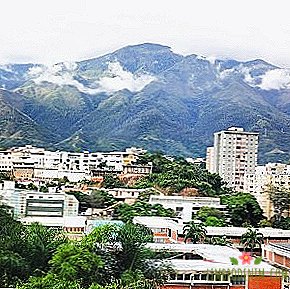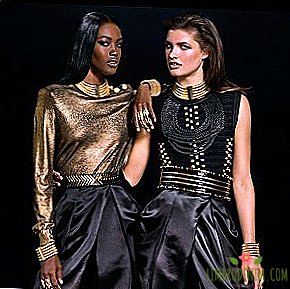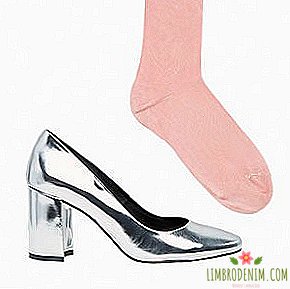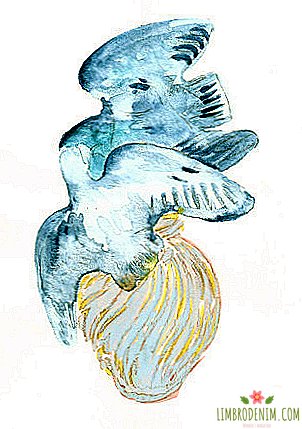Parties, crime and beauty contests: How I left for Venezuela
Third place in the top most dangerous countries; poverty, crime, popular unrest; the highest inflation in the world - in the news about Venezuela rarely say something good, and I, in spite of everything, really miss this country and soon plan to return there. I am a teacher of a foreign language by profession, but for the last five years I have worked as a military translator in Venezuela, and in my native Kazan I have been only on short visits.
From Kazan to Caracas
When in 2007 I graduated from the pedagogical university, nothing foretold that Spanish, which was our second foreign language, would ever come in handy in my life. After receiving a diploma, I got a job at a school as an English teacher, at the same time I taught courses and engaged in tutoring. And then one day a friend offered a side job: it turned out that a delegation of Venezuelans had flown to Kazan as part of military-technical cooperation. They were accommodated in a hotel, whose director urgently sought a translator to communicate with foreign guests - I immediately agreed. It so happened that in 2010 I was invited to transfer classes for Latin American students to the Kazan Higher Artillery School, and then offered to travel under contract to Venezuela. The government of then-President Hugo Chávez concluded a series of contracts for the supply of weapons and military equipment with Russia.
In May 2011, I flew to Caracas for the first time in my life. Before that, I was abroad only a couple of times, and then in Europe. All the familiar Venezuelans in Kazan told me what an incredibly beautiful country they had, and I felt almost deceived when, on my way from the airport to the city, I saw only shabby gray buildings with garlands of linen and heaps of garbage on the side of the highway. Doubts disappeared the next morning, when we went from the capital to Valencia, and in the light of day I saw the visiting card of Caracas El-Avila - the mountain that separates the metropolis from the Caribbean Sea and which was turned into a national park.
Locals are distinguished by innate optimism, and even in the most difficult moments of their lives, as the Venezuelan proverb says, they prefer to “laugh so as not to cry”
From Monday to Friday in Valencia, I worked with other translators in the port, where the equipment arrived from Russia was unloaded, and in the military unit. And on weekends we explored local beaches with white sand and turquoise water.
The first strong shock in an unfamiliar country was for me a local driving style. Venezuelans seem to be too internally free to bother about the rules of the road. And the farther from Caracas, the higher the degree of freedom. Traffic lights are just a familiar part of street scenery, something like Christmas lights. Driving on the red, especially closer to the night, in the order of things. Pedestrians are not at all better than motorists: they don’t look for crossings and don’t wait for a green traffic light signal, but just as one Venezuelan comedian jokes, they draw a trajectory of movement from point A to point B.
Motorcyclists should not be forgotten for a second: they are completely crazy drivers, who quietly leave for the oncoming lane, drive around on lawns, sidewalks and squeeze between cars. There are really a lot of them. In Caracas, for example, mototaxi is one of the most popular, cheap and fast forms of public transport with its official parking. Solid office workers, in suits and ties, riding around the morning traffic jams, is a classic of Caracas.
Luxury women and loud parties
From my five-year business trip I spent most of my time in the Venezuelan capital. Caracas for me is both beautiful and terrible, but well known and dearly loved. Firstly, there is the most pleasant climate in the whole country: twelve months of the year, comfortable summer weather without suffocating heat during the day and with a pleasant cool breeze in the evenings. To the Caribbean at hand. Most people are benevolent and sociable - it’s very easy to be yourself in every sense of the word. Modern Venezuelans, among the descendants of which, in addition to the Spaniards and the indigenous people of the continent, there are also Africans, Jews, Arabs, Portuguese, Italians, Germans (the list goes on), any questions about the origin answer this way: someone has more milk, and someone has more coffee. " As for religion, with an absolute Catholic majority, I did not see any negative in relation to other religions. Locals are distinguished by innate optimism, and even in the most difficult moments of their lives, as the Venezuelan saying says, they prefer to "laugh, so as not to cry."
Venezuelan men have the fame of the most gallant in Latin America: they always hold the door, ask permission to go and give up their place on the subway. I remember that at the very beginning of my career as a translator, I once spoke with a group of Venezuelans and inadvertently dropped a pen - and then ten men simultaneously bent down to pick up this pen. They pay attention to you all the time: in Kazan you won't surprise anyone with shorts, and in Caracas you can accidentally stop a garbage truck - I remember, he got up in the middle of the road and three workers began to tell each other how I look stunning.
A Venezuelan party is always loud, crowded and until the morning. And if Russian hospitality is to feed, then Venezuelan is to be talked about.
Venezuelans are considered the most beautiful women on the continent. They have won the Miss Universe title seven times in the last half century, so beauty contests there are as enthusiastic as the World Cup or the baseball league final. The most attractive are considered the owners of outstanding forms, especially the priests - operations to increase the buttocks are very popular. And if in ordinary life, most Venezuelak prefers a sporty style, then at parties they show themselves in all their glory: tight dresses, heels, bright makeup.
A Venezuelan party is always loud, crowded and until the morning. Drink most often rum with cola and beer. Dancing begins with a romantic salsa and ends with a hard reggaeton. As for food, do not bother much: as a maximum you will be offered meat and sausages on the grill, but are usually limited to a few snacks such as pies and nuts. And if Russian hospitality is to feed, then Venezuelan - to talk. Having learned from bitter experience, I go to local birthdays, only having a good dinner.
Crime, Inflation and Deficit
With all my love for Caracas, it remains the most dangerous city in the Western Hemisphere. Any decent house or residential complex in the Venezuelan capital is surrounded by a high fence and wrapped with barbed wire under tension. Security guards, barriers, police and military patrolling the streets - all this does not save from rabid crime. Thieves attack, hide in slums and go unpunished. This, unfortunately, is as natural there as the good weather and the turquoise color of the Caribbean.
To make your life in Venezuela as safe and comfortable as possible, you need to strictly follow a few rules. First, never to appear on the street in gold jewelry and expensive watches: they will try to assign them. I remember the first time I witnessed such an attack in the center of Caracas: I was going down the subway when a guy jumped at a man a couple of steps away from me, threw him against the wall and tried to tear the chain from his neck. No one around shouted or even tried to detain the thief. Everybody had such a deadpan look, as if nothing had happened, and only my heart was pounding wildly.
Carrying two mobile phones with you - one is good and the other as cheap as possible - the usual Venezuelan practice. An expensive smartphone is used in closed and safe spaces, cheap - on the street. And, however strange it may sound, it is always better to carry some cash with you, even if you went out for a walk with the dog and did not intend to buy anything. The calculation is as follows: in the event of an attack, there will be something to give to the thief, otherwise he will go berserk and might fool your malice.
A separate topic - tinting windows in cars. If it is banned in Russia, in Venezuela, for safety reasons, it is recommended that drivers tinted windows, and the stronger, the better. The robbers, before choosing the victim, are looking at how many people are in the car, and the risk of an attack increases if the driver travels alone. Deaf toning in this case can save things and even life.
I experienced the famous Venezuelan inflation and deficit. According to my feelings, prices are rising on average by 25-30% per month. In any supermarket, no matter how you look there, change the price tags. It’s difficult for foreigners to make a local bank card, so shopping with a bag or a backpack full of cash has become the order of things for me. For example, in December of last year I wanted to dye my hair blue in Caracas. In the barbershop I paid 60 thousand bolivars for this: six hundred bills for one hundred bolivars (there was no larger bill in that moment). Venezuelans themselves everywhere, even on the beach, pay with cards. To withdraw cash is a whole adventure: you have to perform several operations in a row, and the unfortunate ATMs at the same time are practically choked with discounted bills.
The shortage of basic necessities, such as milk, eggs, cornmeal, soap, toothpaste and others, began when the government froze prices on them in conditions of hyperinflation, which put the producers in a hopeless situation. We then lived with other translators at the hotel and saved up toilet paper and shampoo in order to distribute to Venezuelan friends and colleagues later. The shelves in the supermarkets were empty, huge queues lined up around them, but the products themselves, naturally, did not disappear anywhere - everything, only at a price two or three times higher, could be found among speculators. Gaskets and tampons also became scarce, and I once had to go after them to an underground kiosk. The choice there, I say, was more abruptly than any hypermarket.
Gaskets and tampons also became scarce, and I once had to go after them to an underground kiosk. The choice there was more abruptly than any hypermarket
Together with contrasting Caracas, hot Valencia and Caribbean beaches, the state of Zulia will forever remain in my memory. There, in the border with Colombia zone, we went to work. I didn’t really know anything about Sulia, so I was very surprised when I began to notice adults and children on the side of the road with strange devices like sticks with funnels. "They vote? Maybe we will give a lift?" - I calmly asked the driver, why he almost choked on a fried pie with corn.
The Venezuelan laughed heartily, and then explained that all these people were smugglers offering their services. In Venezuela, gasoline is one of the cheapest in the world, and in neighboring Colombia - several times more expensive. So that Colombians would not go to them for fuel, the Venezuelan authorities closed all gas stations within a radius of hundreds of kilometers from the border, and since then entire villages have been living in the illegal trade of gasoline. Road smugglers offer to buy fuel if you are in the border area with an empty tank, or sell them surplus at a price higher than the official one. The most popular cars in the villages of Zulia are old fords with a bottomless tank and a roomy trunk. Driving them from Venezuela to Colombia is a very profitable illegal business. And I, naive, thought the children were late for school.
It could not be otherwise - Venezuela has changed me: she made it softer, she taught me how to look at life, to value people more and less - things. This is a country of eternal summer, where I always want to go back: I start missing Venezuela while still on the plane, when he gains altitude, and his beloved Caribbean Sea glitters under his wing. But I never really thought about moving there for good.





